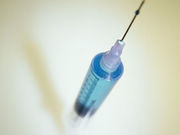CDC panel revises immunization advisory for vaccines in adults
TUESDAY, Feb. 7, 2017 (HealthDay News) — A new adult vaccine schedule from the U.S. Centers for Disease Control and Prevention’s Advisory Committee on Immunization Practices has been published online Feb. 7 in the Annals of Internal Medicine.
One of the major changes is that the nasal influenza vaccine is no longer recommended, as studies have found it largely ineffective. Another update addresses the safety of influenza vaccination in patients with egg allergy. The new guidance states that even patients who develop symptoms like swelling, lightheadedness, or breathing difficulties may get either the inactivated influenza vaccine or recombinant influenza vaccine. But they should receive the injection under supervision of a health care provider who is able to recognize and manage severe allergic conditions.
Regarding the human papillomavirus (HPV) vaccine for adolescents, the committee notes that young people who receive their first dose of the HPV vaccine before age 15 and the second dose at least five months later may be vaccinated in just two doses, instead of the three as was previously recommended. Both the American Cancer Society and the CDC advisory committee still recommend three doses of the HPV vaccine for young adults who were not immunized as adolescents. The vaccine may be given to women through age 26 and men through age 21.
The new immunization schedule recommends that adults with HIV should receive a two-dose series of serogroups A, C, W, and Y meningococcal conjugate vaccine. The schedule also adds patients infected with the hepatitis C virus to the list of those with chronic liver disease who could benefit from a hepatitis B vaccine series. Others who should receive these injections are people with cirrhosis, fatty liver disease, alcoholic liver disease, autoimmune hepatitis, and elevated levels of alanine aminotransferase or aspartate aminotransferase.
Full Text
Copyright © 2017 HealthDay. All rights reserved.








